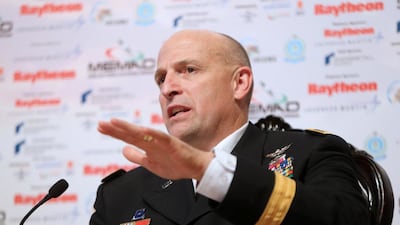ABU DHABI // Firm action must be taken to safeguard the Arabian Gulf as the threat of cruise and ballistic missiles expands globally, experts say.
As non-state players could potentially obtain cruise missiles in the future, the region needs to invest in emerging defensive technologies and Europe should increase its involvement in the region’s security, according to Michael Codner, the editorial director at the Royal United Services Institute for Defence and Security Studies.
“In the longer term, Iran may not be the only or predominant threat,” he said. “But firm actions to counter the threat as it is evolving today are one means of shaping the future threat balance.”
Speaking at the Middle East Missile and Air Defence Symposium in Abu Dhabi yesterday, Mr Codner said cruise missiles had been used in conflicts in Kosovo and Iraq, and they were widely perceived as a prime weapon for coercive diplomacy. “There has been similar Iranian government rhetoric about the development of ballistic missile systems,” he said.
“But the combat reputation of the cruise missile does give it a particular cachet in coercive diplomacy.”
Current Iranian cruise missiles were developed with China and this would continue beyond 2020, said Mr Codner.
“Chinese cruise missile development will give a key indication as to what is likely to be available to Iran,” he said. “It would be wrong to assume that China will be an automatic ally to any adversarial power in the Gulf, but it is a benchmark for future threat capabilities.”
The provision of cruise missiles to non-state parties is another consideration for the future. For instance, Iran had provided anti-ship cruise missiles of Chinese pedigree to Hezbollah, the Shiite Islamist militant group in Lebanon, Dennis Gormley, a senior fellow at the Monterey Institute’s Centre for Nonproliferation Studies, wrote in 2010.
Mr Codner said it should not be assumed that it would be Iran or any other specific countries that would be providing missile capabilities to non-state players.
“But this is a factor for planning of integrated air and missile defence [systems] in a region as complex as the Arabian Gulf where irregular access to cruise-missile systems could be the outcome of civil or proxy wars,” he said.
The detection and tracking of cruise missiles also posed a great challenge, he said.
“Because the [cruise] missile speeds are typically slower than ballistic missiles, the response times are longer,” said Mr Codner.
“But the cruise missile is designed to sea-skim to avoid radar detection, and on land is able to navigate circuitous routes that may avoid radar coverage or hide among terrain features.
“Sharing information of occasional detections and comprehensive integration of this information will be absolutely vital in the Gulf with its complexity of borders and coastlines.”
Integration of intelligence was key to fostering regional cooperation, said Stan Gorenc, a retired major-general of the United States air force. “Putting ideas together and making them work in the field is important,” he said. “The integration aspect and how we fight and build coalitions will be critical as we move forward, but the issue remains of how several countries working together are all using systems that they themselves are trying to integrate correctly within their own services, so it’s a challenge.” Countries in the region need to invest in new defence technologies collectively, according to Neil Thurgood, a brigadier general in the US army. “It is no longer good enough to have a successful standalone weapon system,” he said.
“We must continue our developments to not only fight together but to integrate together. It’s too easy to think we’re integrating when we’re shooting on the same battle-space but on separate targets. That’s no longer good enough.”
Mr Codner said there was a need for Europe to play a bigger role in the Arabian Gulf’s security.
cmalek@thenational.ae


